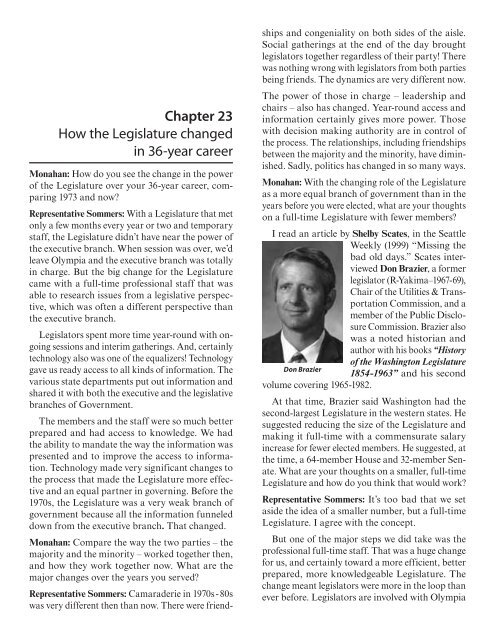Helen Sommers: An Oral History
Helen Sommers: An Oral History
Helen Sommers: An Oral History
You also want an ePaper? Increase the reach of your titles
YUMPU automatically turns print PDFs into web optimized ePapers that Google loves.
Chapter 23<br />
How the Legislature changed<br />
in 36-year career<br />
Monahan: How do you see the change in the power<br />
of the Legislature over your 36-year career, comparing<br />
1973 and now?<br />
Representative <strong>Sommers</strong>: With a Legislature that met<br />
only a few months every year or two and temporary<br />
staff, the Legislature didn’t have near the power of<br />
the executive branch. When session was over, we’d<br />
leave Olympia and the executive branch was totally<br />
in charge. But the big change for the Legislature<br />
came with a full-time professional staff that was<br />
able to research issues from a legislative perspective,<br />
which was often a different perspective than<br />
the executive branch.<br />
Legislators spent more time year-round with ongoing<br />
sessions and interim gatherings. <strong>An</strong>d, certainly<br />
technology also was one of the equalizers! Technology<br />
gave us ready access to all kinds of information. The<br />
various state departments put out information and<br />
shared it with both the executive and the legislative<br />
branches of Government.<br />
The members and the staff were so much better<br />
prepared and had access to knowledge. We had<br />
the ability to mandate the way the information was<br />
presented and to improve the access to information.<br />
Technology made very significant changes to<br />
the process that made the Legislature more effective<br />
and an equal partner in governing. Before the<br />
1970s, the Legislature was a very weak branch of<br />
government because all the information funneled<br />
down from the executive branch . That changed.<br />
Monahan: Compare the way the two parties – the<br />
majority and the minority – worked together then,<br />
and how they work together now. What are the<br />
major changes over the years you served?<br />
Representative <strong>Sommers</strong>: Camaraderie in 1970s - 80s<br />
was very different then than now. There were friend-<br />
ships and congeniality on both sides of the aisle.<br />
Social gatherings at the end of the day brought<br />
legislators together regardless of their party! There<br />
was nothing wrong with legislators from both parties<br />
being friends. The dynamics are very different now.<br />
The power of those in charge – leadership and<br />
chairs – also has changed. Year-round access and<br />
information certainly gives more power. Those<br />
with decision making authority are in control of<br />
the process. The relationships, including friendships<br />
between the majority and the minority, have diminished.<br />
Sadly, politics has changed in so many ways.<br />
Monahan: With the changing role of the Legislature<br />
as a more equal branch of government than in the<br />
years before you were elected, what are your thoughts<br />
on a full-time Legislature with fewer members?<br />
I read an article by Shelby Scates, in the Seattle<br />
Weekly (1999) “Missing the<br />
bad old days.” Scates interviewed<br />
Don Brazier, a former<br />
legislator (R-Yakima–1967-69),<br />
Chair of the Utilities & Transportation<br />
Commission, and a<br />
member of the Public Disclosure<br />
Commission. Brazier also<br />
was a noted historian and<br />
author with his books “<strong>History</strong><br />
of the Washington Legislature<br />
Don Brazier<br />
1854-1963” and his second<br />
volume covering 1965-1982.<br />
At that time, Brazier said Washington had the<br />
second-largest Legislature in the western states. He<br />
suggested reducing the size of the Legislature and<br />
making it full-time with a commensurate salary<br />
increase for fewer elected members. He suggested, at<br />
the time, a 64-member House and 32-member Senate.<br />
What are your thoughts on a smaller, full-time<br />
Legislature and how do you think that would work?<br />
Representative <strong>Sommers</strong>: It’s too bad that we set<br />
aside the idea of a smaller number, but a full-time<br />
Legislature. I agree with the concept.<br />
But one of the major steps we did take was the<br />
professional full-time staff. That was a huge change<br />
for us, and certainly toward a more efficient, better<br />
prepared, more knowledgeable Legislature. The<br />
change meant legislators were more in the loop than<br />
ever before. Legislators are involved with Olympia
















